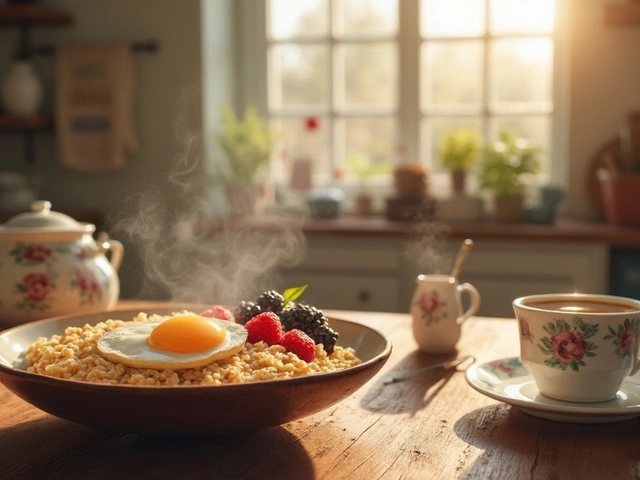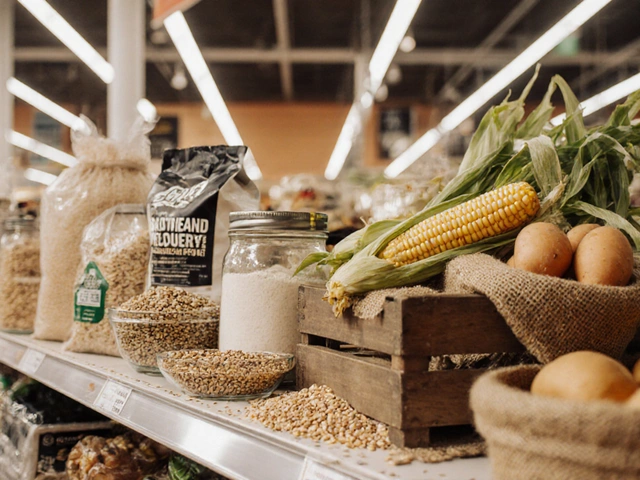You ever find yourself dozing off soon after a big meal? It might not just be the food coma from overeating. Certain foods can actually make you sleepy, and they do it by affecting the brain's chemistry. Before reaching for those sleeping pills, you might want to check out what's on your plate instead.
Some foods are rich in tryptophan, an amino acid that our bodies convert into serotonin and then melatonin, the hormone that regulates sleep. Ever heard of the turkey effect after Thanksgiving dinners? Yup, turkey is known for its high tryptophan content. But it's not alone; you'll find tryptophan in other foods too.
Carbs play an interesting role, too. They help the body absorb more tryptophan, so pairing foods like rice or bread with turkey or other tryptophan-rich foods can enhance that sleepy feeling. But remember, balance is key! Too much and you’re more likely to feel sluggish than rested.
- Understanding Sleep-Inducing Foods
- Comfort Foods to Try
- Recipes to Facilitate Sleep
- Tips for More Restful Nights
Understanding Sleep-Inducing Foods
When it comes to achieving a good night's rest, it's not just about counting sheep. The foods you eat can greatly influence how sleepy you feel. Let's dig into what makes some foods true sleep-inducers.
Role of Tryptophan
First off, tryptophan is a heavy hitter in the sleep department. This amino acid is found in foods like turkey, chicken, eggs, and nuts. Once ingested, tryptophan makes its way to the brain, where it turns into serotonin. Eventually, serotonin is converted into melatonin, the hormone that's got your sleep-wake cycle on lock.
Carbs: The Sleep Sidekick
Now, without being too technical, carbs sort of act like a helpful buddy, making it easier for tryptophan to get to your brain. This is why those big meals with pasta or bread can leave you feeling ready to nap soon after.
Other Sleep-Boosting Ingredients
But it ain't just about tryptophan and carbs. Magnesium and calcium are important too. Foods like almonds and leafy greens are high in magnesium, which can help calm nerves and relax muscles, adding to that sleepy feeling. Dairy products, with their calcium content, can promote relaxation too.
| Ingredient | Found in Foods |
|---|---|
| Tryptophan | Turkey, Chicken, Eggs, Nuts |
| Carbohydrates | Pasta, Bread, Rice |
| Magnesium | Almonds, Spinach, Kale |
| Calcium | Dairy Products, Kale |
Timing Matters
Now, timing can be crucial. Eating these sleep-inducing foods about an hour before hitting the hay can be just right. Give your body the chance to absorb and process these nutrients for the best effect.
Comfort Foods to Try
Alright, let's talk about some comfort foods that can make you sink into a restful slumber. If you're like me and love cozy meals, these options will have you dreaming in no time.
Oatmeal
Oatmeal isn't just for breakfast anymore. It's packed with complex carbs and even a bit of melatonin, thanks to oats being a natural source. Prepare a warm bowl with a sprinkle of nutmeg or cinnamon to add a soothing touch. Top it with bananas or a handful of almonds to boost that sleepy feeling since both are great sources of magnesium, which promotes muscle relaxation.
Chamomile Tea
Okay, not exactly food, but close enough! Chamomile tea is a classic comforting beverage known for its calming effects. It's been used for centuries to reduce stress and help you unwind. Sip a steamy cup after dinner for a gentle push toward relaxation.
Cheese and Crackers
Who said cheese is just for parties? A modest serving of cheese with whole-grain crackers can be incredibly satisfying. The cheese provides tryptophan, while the crackers add a bit of carb magic to help the tryptophan do its thing. Just keep it balanced to avoid feeling too full.
Sweet Potatoes
These are not only delicious but also a powerhouse of sleep-friendly nutrients. Rich in complex carbs that stimulate serotonin production, sweet potatoes are comforting and filling. Roast them, mash them, or bake them into fries as a side dish for your evening meal.
Warm Milk
An old-school remedy that has stood the test of time. There's a reason warm milk is associated with bedtime routines—it's a good source of both tryptophan and calcium, which helps the brain use tryptophan effectively. Plus, there's something inherently soothing about sipping warm milk, isn’t there?

Recipes to Facilitate Sleep
When it comes to **comfort food recipes** that help you catch some z's, it’s all about mixing the right ingredients. You want something easy, soothing, and rich in nutrients known to promote restful sleep.
1. Creamy Turkey and Spinach Wrap
This dish combines **turkey** and **spinach**, packed with tryptophan and magnesium. Magnesium is known to help relax muscles, another factor in getting a solid night sleep.
- Ingredients: Whole wheat wraps, 1 cup cooked turkey, 1 cup fresh spinach, cream cheese, a pinch of salt and pepper.
- Instructions: Spread cream cheese on the wrap, layer with turkey and spinach. Season with salt and pepper. Roll it up and enjoy!
2. Banana Almond Smoothie
Bananas are a great source of potassium and magnesium, both of which aid relaxation. Pair it with almonds, which are high in melatonin, and you've got a bedtime drink that's healthier than hot milk.
- Ingredients: 1 banana, 1/4 cup almonds, 1 cup milk (or almond milk), honey (optional), a sprinkle of cinnamon.
- Instructions: Blend all ingredients until smooth. Pour into a glass and drink up!
3. Chamomile Honey Rice Pudding
This classic pudding gets a bedtime twist with chamomile tea, believed to improve sleep quality. The carbs from the rice ensure tryptophan is absorbed efficiently.
- Ingredients: 1 cup cooked rice, 1 cup chamomile tea, 1/2 cup milk, 2 tablespoons honey, 1/2 teaspoon vanilla extract.
- Instructions: Heat rice, tea, and milk in a pan. Stir in honey and vanilla. Cook until thick. Serve warm.
Feel free to tweak these **recipes** to your taste while keeping the main ingredients intact for a tranquil night. You just might find the change in your dinner plate could lead to better sleep.
Tips for More Restful Nights
If you're struggling with sleep, small changes can lead to big differences. Here's how you can enhance your nights with simple tweaks, focusing on what you consume.
Time Your Meals
Avoid heavy dinners late at night. Give your digestive system enough time to handle dinner before hitting the sack. Ideally, eating about 2-3 hours before bedtime works best.
Balance Your Plate
Opt for balanced meals that include tryptophan-rich foods combined with carbs. Try mixing turkey with a side of rice or serving a slice of cheese with whole-grain crackers.
Watch the Caffeine
Keep tabs on caffeine intake, especially in the afternoon and evening. Remember, caffeine isn't just in coffee; it's in tea, chocolate, and some sodas too.
Bedtime Snacks
Instead of cutting off eating close to bedtime, consider a light snack with sleep-promoting foods. A small bowl of cereal with milk or a banana could be great choices.
Hydration Matters
Stay hydrated but avoid excessive water just before bed to prevent middle-of-the-night bathroom trips. Make sure you're drinking fluids consistently throughout the day.
Routine Is Key
Bodies love routine. Try to stick to a regular schedule not just with meals, but with sleep too. Go to bed and wake up around the same time every day.








Write a comment